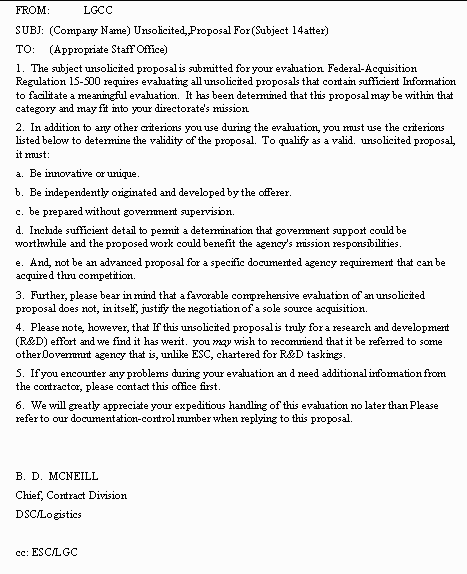SAMPLE LETTER, (COMPANY NAME) UNSOLICITED PROPOSAL FOR (SUBJECT MATTER)
SAMPLE LETTER, (COMPANY NAME) UNSOLICITED PROPOSAL FOR (SUBJECT MATTER)
SUBJECT: Acknowledgement of Unsolicited Proposal for (Subject Matter)
TO: (Company's Name)
1. The Electronic Security Command has received your unsolicited proposal. Your point of contact for all future correspondence on this matter will be B. D. McNeill, 512/925-2821, the unsolicited-proposal officer (UPO) for this command. Please director all future correspondence to the UPO at:
2. The Electronic Security Command is interested in receiving and evaluating voluntary submissions containing new ideas, suggestions, and inventive concepts germane to the Air Force's potential needs. The military has many personnel and contractors working on various projects; consequently, the substance of this submission may already be known to government employees or government contractors, be in the public domain, orbe available now or later from sources other than this submission. Accordingly, it is desirable, in receiving voluntary submissions for evaluation, to exercise such precaution as will preclude misunderstanding by the submitter and prevent such submissions from having any restrictive or limiting effect on the Government's research and development programs.
3. You should understand that acceptance for evaluation for potential usefulness to the Air Force does not imply a promise to pay; a recognition of novelty, originality, or uniqueness; or a contractual relationship which would render the government liable to pay for any use of information to which it would otherwise be entitled. The evaluation or testing of voluntary submissions will in no way obligate the government to procure experimental, production, or other quantities of the articles submitted or the item covered by the disclosure.
4. We will handle voluntary submissions carefully. However, the government will not assume responsibility or liability to submitters or others for:
5. You may furnish instructions concerning the disposal of your voluntary submission provided such instructions are furnished before compoleting the evaluation.
6. The Air Force will handle your voluntary submission according to government procedures for safeguarding such information against unaurhorized disclosure. In addition, we will not disclose data forming a part of or constituting the submission outside the government or duplicate, use, or disclose in whole or in part by the Air Force, except for record purposes or to evaluate the proposal. This restriction does not limit the government's right to use information contained in such data if it is obtained from another source or is in the public domain. Liability due to unauthorized disclosure by the government will under no circumstances extend beyond the damage to the submitter caused by acts of the government and cognizable in law. Furthermore, the government accepts no liablity for failure to safeguard information unless the information consists of a patentable invention, copyrighted material, or data constituting a trade secret.
7. We will furnish information convering the results of your submission's evaluation to you. Such information shall not be construed as an indoresment by the government of articles or the subject matter of disclosures nor shall they be used in whole or in part for advertising purposes with industry or other government agencies.
8. These terms shall apply to all submitted articles and disclosures.
